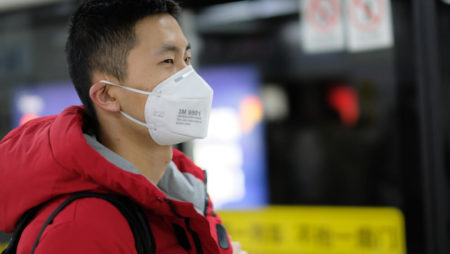

Thus far, Covid-19 has only impacted brick-and-mortar casinos in Asia, especially Macao. However, that has now spread to the United States.
Recently, the Wildhorse Resort & Casino in Pendleton, Oregon temporarily closed for deep cleaning due to a worker testing positive for the virus. The casino is located in Eastern Oregon, on the Confederated Tribes of the Umatilla Indian Reservation.
Casinos are an especially risky place for contagion. They are crowded, and some casino patrons sit for many hours, touching slot machines, over and over. Anything that has been touched by many hands is a possible disease vector, including slot machines. Also, many of the slot machine patrons are elderly, and in poor health. Those two elements alone could create an outbreak of disease.
For table game players, casino chips can also serve as a disease vector.
Everyone should avoid crowded public places during an outbreak of disease. That included attending events like concerts and sports, shopping at the mall, and so forth. Unfortunately, in addition to gambling, many casinos also offer their visitors entertainment and shopping.
Even worse, many casinos are also resort hotels, relying on business from travelers. As travel restrictions are implemented to slow the spread of Covid-19, the casinos suffer.
What we cover
Coronavirus is Already Affecting Earnings
For example, MGM International held back its 2020 guidance in the company’s latest earnings report due to the coronavirus. That’s mostly due to the shutting down of its properties in Macau. However, European casinos are now feeling the effects, as the virus storms Italy, the Netherlands, and other countries.
Las Vegas casinos are wisely taking proactive measures against Covid-19. For example, there have been serious discussions about whether possible travel restrictions could lead to the cancellation of the World Series of Poker this summer. The potential for the virus at the World Series of Poker is not untenable.
Online Gambling is a Poor Substitute for Some
It’s safe to assume that Covid-19 won’t have an impact on online gambling. Gambling safe inside your own home is essentially risk-free. In fact, a pandemic might be something that benefits the online gaming and sports betting industry.
Initially, there was a fear that online gambling would hurt the land-based casinos. But things didn’t work out that way in reality. For example, in New Jersey, land-based casino revenues actually increased since online gambling was legalized.
Likewise, it’s unrealistic to expect that casino visitors will stay home because of the virus, and will play online instead. Many casino visitors who play the slots are older, and unfamiliar with mobile technology. Also, some people just like to get out of the house, and into an alternate reality of a casino floor.
The bottom line is, the business that will be lost from both in-state and out-of-state casino visitors won’t be recovered from online gambling.
However, some casino-goers will switch over, finding that gambling online is a decent alternative. Online poker sites often experience an increase in traffic during bad weather, when people are forced to stay at home. People remaining in their homes due to the virus could have a similar effect, which would be a boon for the online operators.
The Philippines Gets a Boost from Macau Shutting Down
Asia is already seeing that effect. Gambling is wildly popular among the Chinese. Offshore gambling operators in the Philippines are already reaping the benefits from the quarantines in Macao and China. The two main options for wealthy Chinese to gamble are the casinos in Macau and offshore gambling sites. Many of those are located in the Philippines.
On February 5, the government of Macau ordered every casino shut down to stop the coronavirus from spreading. While the government has since allowed the casinos to reopen, the number of visitors is still down. As a result, gambling revenue is down by 88% in Macau, and that has had a ripple effect worldwide.
On Feb. 24, South Korea ordered the closure of its Kangwon Land casino due to the coronavirus. So the trend continues, as Covid-19 spreads across East Asia.
While the virus has ravaged the land-based casinos in Asia, the offshore operators in the Philippines have been booming. During the Chinese New Year celebration this February, traffic was up by 90% compared to the same period last year.
While Asian gamblers are now free to visit the Macau casinos, it looks like land-based gambling will continue to suffer, due to overseas travel bans. However, that’s good news for the offshore gambling operators in the Philippines, at least until the pandemic is under control.
The Dangers of Unregulated Online Gambling
Gamblers in China playing with online operators out of the Philippines may simply be trading one danger for another.
Despite the fact that many operators are licensed by the Philippines government, they have very little oversight. Because of the perceived economic benefits, offshore gambling would bring, President Duterte permitted them to operate, with no real plan to control them. As a result, the Philippine gambling industry has become the purview of organized crime.
Anyone playing on a website out of the Philippines runs a high risk of fraud, when compared to the casinos in Macau. Although the latter is not perfect, regulations and enforcement have tightened over the years.
The criminal gambling enterprises have done even more damage within the Philippines. The same criminal organizations that run the websites are also engaged in serious crimes like kidnapping and human trafficking.
China has attempted to crack down on these nefarious gambling websites, which are largely staffed by Chinese expatriates. The Chinese government has stripped thousands of these ex-pats of their passwords, as well as deporting these criminals.
Unfortunately, these efforts have done very little to stop illegal gambling; if anything, these efforts have only increased the criminal element.
How Will the China Situation Affect US Online Gambling?
The United States is currently divided, with some states taking an open approach to online gambling, and others completely prohibiting it.
The situation in China with illegal, offshore gambling could serve as a warning for state legislators around the country. The fact is, demand for online gambling exists, and without a legal option, illegal offshore websites will fill that demand.
The states with legalized online betting could see a boost in revenue from those websites even if the land-based casinos in the state suffer due to a pandemic. States without legal, online gambling could suffer from both lost tax revenue as well as an increase in illegal online gambling.





